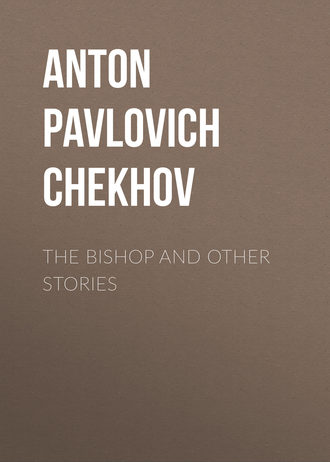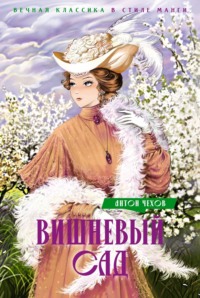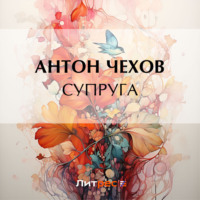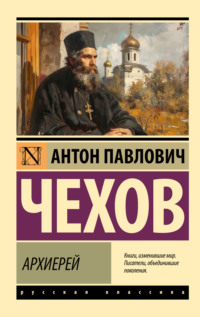 полная версия
полная версияThe Bishop and Other Stories
"That's true. But what am I to write to him, to what effect? If I write to him, he will answer, 'Why? what for? Why is it a sin?'"
Father Anastasy laughed hoarsely again, and brandished his fingers.
"Why? what for? why is it a sin?" he began shrilly. "I was once confessing a gentleman, and I told him that excessive confidence in the Divine Mercy is a sin; and he asked, 'Why?' I tried to answer him, but – " Anastasy slapped himself on the forehead. "I had nothing here. He-he-he-he!."
Anastasy's words, his hoarse jangling laugh at what was not laughable, had an unpleasant effect on his Reverence and on the deacon. The former was on the point of saying, "Don't interfere" again, but he did not say it, he only frowned.
"I can't write to him," sighed the deacon.
"If you can't, who can?"
"Father Fyodor!" said the deacon, putting his head on one side and pressing his hand to his heart. "I am an uneducated slow-witted man, while the Lord has vouchsafed you judgment and wisdom. You know everything and understand everything. You can master anything, while I don't know how to put my words together sensibly. Be generous. Instruct me how to write the letter. Teach me what to say and how to say it.."
"What is there to teach? There is nothing to teach. Sit down and write."
"Oh, do me the favour, Father Fyodor! I beseech you! I know he will be frightened and will attend to your letter, because, you see, you are a cultivated man too. Do be so good! I'll sit down, and you'll dictate to me. It will be a sin to write to-morrow, but now would be the very time; my mind would be set at rest."
His Reverence looked at the deacon's imploring face, thought of the disagreeable Pyotr, and consented to dictate. He made the deacon sit down to his table and began.
"Well, write.. 'Christ is risen, dear son.' exclamation mark. 'Rumours have reached me, your father,' then in parenthesis, 'from what source is no concern of yours.' close the parenthesis… Have you written it? 'That you are leading a life inconsistent with the laws both of God and of man. Neither the luxurious comfort, nor the worldly splendour, nor the culture with which you seek outwardly to disguise it, can hide your heathen manner of life. In name you are a Christian, but in your real nature a heathen as pitiful and wretched as all other heathens – more wretched, indeed, seeing that those heathens who know not Christ are lost from ignorance, while you are lost in that, possessing a treasure, you neglect it. I will not enumerate here your vices, which you know well enough; I will say that I see the cause of your ruin in your infidelity. You imagine yourself to be wise, boast of your knowledge of science, but refuse to see that science without faith, far from elevating a man, actually degrades him to the level of a lower animal, inasmuch as..'" The whole letter was in this strain.
When he had finished writing it the deacon read it aloud, beamed all over and jumped up.
"It's a gift, it's really a gift!" he said, clasping his hands and looking enthusiastically at his Reverence. "To think of the Lord's bestowing a gift like that! Eh? Holy Mother! I do believe I couldn't write a letter like that in a hundred years. Lord save you!"
Father Anastasy was enthusiastic too.
"One couldn't write like that without a gift," he said, getting up and wagging his fingers – "that one couldn't! His rhetoric would trip any philosopher and shut him up. Intellect. Brilliant intellect! If you weren't married, Father Fyodor, you would have been a bishop long ago, you would really!"
Having vented his wrath in a letter, his Reverence felt relieved; his fatigue and exhaustion came back to him. The deacon was an old friend, and his Reverence did not hesitate to say to him:
"Well deacon, go, and God bless you. I'll have half an hour's nap on the sofa; I must rest."
The deacon went away and took Anastasy with him. As is always the case on Easter Eve, it was dark in the street, but the whole sky was sparkling with bright luminous stars. There was a scent of spring and holiday in the soft still air.
"How long was he dictating?" the deacon said admiringly. "Ten minutes, not more! It would have taken someone else a month to compose such a letter. Eh! What a mind! Such a mind that I don't know what to call it! It's a marvel! It's really a marvel!"
"Education!" sighed Anastasy as he crossed the muddy street; holding up his cassock to his waist. "It's not for us to compare ourselves with him. We come of the sacristan class, while he has had a learned education. Yes, he's a real man, there is no denying that."
"And you listen how he'll read the Gospel in Latin at mass to-day! He knows Latin and he knows Greek… Ah Petrushka, Petrushka!" the deacon said, suddenly remembering. "Now that will make him scratch his head! That will shut his mouth, that will bring it home to him! Now he won't ask 'Why.' It is a case of one wit to outwit another! Haha-ha!"
The deacon laughed gaily and loudly. Since the letter had been written to Pyotr he had become serene and more cheerful. The consciousness of having performed his duty as a father and his faith in the power of the letter had brought back his mirthfulness and good-humour.
"Pyotr means a stone," said he, as he went into his house. "My Pyotr is not a stone, but a rag. A viper has fastened upon him and he pampers her, and hasn't the pluck to kick her out. Tfoo! To think there should be women like that, God forgive me! Eh? Has she no shame? She has fastened upon the lad, sticking to him, and keeps him tied to her apron strings… Fie upon her!"
"Perhaps it's not she keeps hold of him, but he of her?"
"She is a shameless one anyway! Not that I am defending Pyotr… He'll catch it. He'll read the letter and scratch his head! He'll burn with shame!"
"It's a splendid letter, only you know I wouldn't send it, Father
Deacon. Let him alone."
"What?" said the deacon, disconcerted.
"Why… Don't send it, deacon! What's the sense of it? Suppose you send it; he reads it, and.. and what then? You'll only upset him. Forgive him. Let him alone!"
The deacon looked in surprise at Anastasy's dark face, at his unbuttoned cassock, which looked in the dusk like wings, and shrugged his shoulders.
"How can I forgive him like that?" he asked. "Why I shall have to answer for him to God!"
"Even so, forgive him all the same. Really! And God will forgive you for your kindness to him."
"But he is my son, isn't he? Ought I not to teach him?"
"Teach him? Of course – why not? You can teach him, but why call him a heathen? It will hurt his feelings, you know, deacon.."
The deacon was a widower, and lived in a little house with three windows. His elder sister, an old maid, looked after his house for him, though she had three years before lost the use of her legs and was confined to her bed; he was afraid of her, obeyed her, and did nothing without her advice. Father Anastasy went in with him. Seeing his table already laid with Easter cakes and red eggs, he began weeping for some reason, probably thinking of his own home, and to turn these tears into a jest, he at once laughed huskily.
"Yes, we shall soon be breaking the fast," he said. "Yes.. it wouldn't come amiss, deacon, to have a little glass now. Can we? I'll drink it so that the old lady does not hear," he whispered, glancing sideways towards the door.
Without a word the deacon moved a decanter and wineglass towards him. He unfolded the letter and began reading it aloud. And now the letter pleased him just as much as when his Reverence had dictated it to him. He beamed with pleasure and wagged his head, as though he had been tasting something very sweet.
"A-ah, what a letter!" he said. "Petrushka has never dreamt of such a letter. It's just what he wants, something to throw him into a fever.."
"Do you know, deacon, don't send it!" said Anastasy, pouring himself out a second glass of vodka as though unconsciously. "Forgive him, let him alone! I am telling you.. what I really think. If his own father can't forgive him, who will forgive him? And so he'll live without forgiveness. Think, deacon: there will be plenty to chastise him without you, but you should look out for some who will show mercy to your son! I'll.. I'll.. have just one more. The last, old man… Just sit down and write straight off to him, 'I forgive you Pyotr!' He will under-sta-and! He will fe-el it! I understand it from myself, you see old man.. deacon, I mean. When I lived like other people, I hadn't much to trouble about, but now since I lost the image and semblance, there is only one thing I care about, that good people should forgive me. And remember, too, it's not the righteous but sinners we must forgive. Why should you forgive your old woman if she is not sinful? No, you must forgive a man when he is a sad sight to look at.. yes!"
Anastasy leaned his head on his fist and sank into thought.
"It's a terrible thing, deacon," he sighed, evidently struggling with the desire to take another glass – "a terrible thing! In sin my mother bore me, in sin I have lived, in sin I shall die… God forgive me, a sinner! I have gone astray, deacon! There is no salvation for me! And it's not as though I had gone astray in my life, but in old age – at death's door.. I."
The old man, with a hopeless gesture, drank off another glass, then got up and moved to another seat. The deacon, still keeping the letter in his hand, was walking up and down the room. He was thinking of his son. Displeasure, distress and anxiety no longer troubled him; all that had gone into the letter. Now he was simply picturing Pyotr; he imagined his face, he thought of the past years when his son used to come to stay with him for the holidays. His thoughts were only of what was good, warm, touching, of which one might think for a whole lifetime without wearying. Longing for his son, he read the letter through once more and looked questioningly at Anastasy.
"Don't send it," said the latter, with a wave of his hand.
"No, I must send it anyway; I must.. bring him to his senses a little, all the same. It's just as well.."
The deacon took an envelope from the table, but before putting the letter into it he sat down to the table, smiled and added on his own account at the bottom of the letter:
"They have sent us a new inspector. He's much friskier than the old one. He's a great one for dancing and talking, and there's nothing he can't do, so that all the Govorovsky girls are crazy over him. Our military chief, Kostyrev, will soon get the sack too, they say. High time he did!" And very well pleased, without the faintest idea that with this postscript he had completely spoiled the stern letter, the deacon addressed the envelope and laid it in the most conspicuous place on the table.
EASTER EVE
I was standing on the bank of the River Goltva, waiting for the ferry-boat from the other side. At ordinary times the Goltva is a humble stream of moderate size, silent and pensive, gently glimmering from behind thick reeds; but now a regular lake lay stretched out before me. The waters of spring, running riot, had overflowed both banks and flooded both sides of the river for a long distance, submerging vegetable gardens, hayfields and marshes, so that it was no unusual thing to meet poplars and bushes sticking out above the surface of the water and looking in the darkness like grim solitary crags.
The weather seemed to me magnificent. It was dark, yet I could see the trees, the water and the people… The world was lighted by the stars, which were scattered thickly all over the sky. I don't remember ever seeing so many stars. Literally one could not have put a finger in between them. There were some as big as a goose's egg, others tiny as hempseed… They had come out for the festival procession, every one of them, little and big, washed, renewed and joyful, and everyone of them was softly twinkling its beams. The sky was reflected in the water; the stars were bathing in its dark depths and trembling with the quivering eddies. The air was warm and still… Here and there, far away on the further bank in the impenetrable darkness, several bright red lights were gleaming..
A couple of paces from me I saw the dark silhouette of a peasant in a high hat, with a thick knotted stick in his hand.
"How long the ferry-boat is in coming!" I said.
"It is time it was here," the silhouette answered.
"You are waiting for the ferry-boat, too?"
"No I am not," yawned the peasant – "I am waiting for the illumination. I should have gone, but to tell you the truth, I haven't the five kopecks for the ferry."
"I'll give you the five kopecks."
"No; I humbly thank you… With that five kopecks put up a candle for me over there in the monastery… That will be more interesting, and I will stand here. What can it mean, no ferry-boat, as though it had sunk in the water!"
The peasant went up to the water's edge, took the rope in his hands, and shouted; "Ieronim! Ieron – im!"
As though in answer to his shout, the slow peal of a great bell floated across from the further bank. The note was deep and low, as from the thickest string of a double bass; it seemed as though the darkness itself had hoarsely uttered it. At once there was the sound of a cannon shot. It rolled away in the darkness and ended somewhere in the far distance behind me. The peasant took off his hat and crossed himself.
'"Christ is risen," he said.
Before the vibrations of the first peal of the bell had time to die away in the air a second sounded, after it at once a third, and the darkness was filled with an unbroken quivering clamour. Near the red lights fresh lights flashed, and all began moving together and twinkling restlessly.
"Ieron – im!" we heard a hollow prolonged shout.
"They are shouting from the other bank," said the peasant, "so there is no ferry there either. Our Ieronim has gone to sleep."
The lights and the velvety chimes of the bell drew one towards them… I was already beginning to lose patience and grow anxious, but behold at last, staring into the dark distance, I saw the outline of something very much like a gibbet. It was the long-expected ferry. It moved towards us with such deliberation that if it had not been that its lines grew gradually more definite, one might have supposed that it was standing still or moving to the other bank.
"Make haste! Ieronim!" shouted my peasant. "The gentleman's tired of waiting!"
The ferry crawled to the bank, gave a lurch and stopped with a creak. A tall man in a monk's cassock and a conical cap stood on it, holding the rope.
"Why have you been so long?" I asked jumping upon the ferry.
"Forgive me, for Christ's sake," Ieronim answered gently. "Is there no one else?"
"No one.."
Ieronim took hold of the rope in both hands, bent himself to the figure of a mark of interrogation, and gasped. The ferry-boat creaked and gave a lurch. The outline of the peasant in the high hat began slowly retreating from me – so the ferry was moving off. Ieronim soon drew himself up and began working with one hand only. We were silent, gazing towards the bank to which we were floating. There the illumination for which the peasant was waiting had begun. At the water's edge barrels of tar were flaring like huge camp fires. Their reflections, crimson as the rising moon, crept to meet us in long broad streaks. The burning barrels lighted up their own smoke and the long shadows of men flitting about the fire; but further to one side and behind them from where the velvety chime floated there was still the same unbroken black gloom. All at once, cleaving the darkness, a rocket zigzagged in a golden ribbon up the sky; it described an arc and, as though broken to pieces against the sky, was scattered crackling into sparks. There was a roar from the bank like a far-away hurrah.
"How beautiful!" I said.
"Beautiful beyond words!" sighed Ieronim. "Such a night, sir! Another time one would pay no attention to the fireworks, but to-day one rejoices in every vanity. Where do you come from?"
I told him where I came from.
"To be sure.. a joyful day to-day.." Ieronim went on in a weak sighing tenor like the voice of a convalescent. "The sky is rejoicing and the earth and what is under the earth. All the creatures are keeping holiday. Only tell me kind sir, why, even in the time of great rejoicing, a man cannot forget his sorrows?"
I fancied that this unexpected question was to draw me into one of those endless religious conversations which bored and idle monks are so fond of. I was not disposed to talk much, and so I only asked:
"What sorrows have you, father?"
"As a rule only the same as all men, kind sir, but to-day a special sorrow has happened in the monastery: at mass, during the reading of the Bible, the monk and deacon Nikolay died."
"Well, it's God's will!" I said, falling into the monastic tone.
"We must all die. To my mind, you ought to rejoice indeed..
They say if anyone dies at Easter he goes straight to the kingdom of heaven."
"That's true."
We sank into silence. The figure of the peasant in the high hat melted into the lines of the bank. The tar barrels were flaring up more and more.
"The Holy Scripture points clearly to the vanity of sorrow and so does reflection," said Ieronim, breaking the silence, "but why does the heart grieve and refuse to listen to reason? Why does one want to weep bitterly?"
Ieronim shrugged his shoulders, turned to me and said quickly:
"If I died, or anyone else, it would not be worth notice perhaps; but, you see, Nikolay is dead! No one else but Nikolay! Indeed, it's hard to believe that he is no more! I stand here on my ferry-boat and every minute I keep fancying that he will lift up his voice from the bank. He always used to come to the bank and call to me that I might not be afraid on the ferry. He used to get up from his bed at night on purpose for that. He was a kind soul. My God! how kindly and gracious! Many a mother is not so good to her child as Nikolay was to me! Lord, save his soul!"
Ieronim took hold of the rope, but turned to me again at once.
"And such a lofty intelligence, your honour," he said in a vibrating voice. "Such a sweet and harmonious tongue! Just as they will sing immediately at early matins: 'Oh lovely! oh sweet is Thy Voice!' Besides all other human qualities, he had, too, an extraordinary gift!"
"What gift?" I asked.
The monk scrutinized me, and as though he had convinced himself that he could trust me with a secret, he laughed good-humouredly.
"He had a gift for writing hymns of praise," he said. "It was a marvel, sir; you couldn't call it anything else! You would be amazed if I tell you about it. Our Father Archimandrite comes from Moscow, the Father Sub-Prior studied at the Kazan academy, we have wise monks and elders, but, would you believe it, no one could write them; while Nikolay, a simple monk, a deacon, had not studied anywhere, and had not even any outer appearance of it, but he wrote them! A marvel! A real marvel!" Ieronim clasped his hands and, completely forgetting the rope, went on eagerly:
"The Father Sub-Prior has great difficulty in composing sermons; when he wrote the history of the monastery he worried all the brotherhood and drove a dozen times to town, while Nikolay wrote canticles! Hymns of praise! That's a very different thing from a sermon or a history!"
"Is it difficult to write them?" I asked.
"There's great difficulty!" Ieronim wagged his head. "You can do nothing by wisdom and holiness if God has not given you the gift. The monks who don't understand argue that you only need to know the life of the saint for whom you are writing the hymn, and to make it harmonize with the other hymns of praise. But that's a mistake, sir. Of course, anyone who writes canticles must know the life of the saint to perfection, to the least trivial detail. To be sure, one must make them harmonize with the other canticles and know where to begin and what to write about. To give you an instance, the first response begins everywhere with 'the chosen' or 'the elect.'.. The first line must always begin with the 'angel.' In the canticle of praise to Jesus the Most Sweet, if you are interested in the subject, it begins like this: 'Of angels Creator and Lord of all powers!' In the canticle to the Holy Mother of God: 'Of angels the foremost sent down from on high,' to Nikolay, the Wonder-worker – 'An angel in semblance, though in substance a man,' and so on. Everywhere you begin with the angel. Of course, it would be impossible without making them harmonize, but the lives of the saints and conformity with the others is not what matters; what matters is the beauty and sweetness of it. Everything must be harmonious, brief and complete. There must be in every line softness, graciousness and tenderness; not one word should be harsh or rough or unsuitable. It must be written so that the worshipper may rejoice at heart and weep, while his mind is stirred and he is thrown into a tremor. In the canticle to the Holy Mother are the words: 'Rejoice, O Thou too high for human thought to reach! Rejoice, O Thou too deep for angels' eyes to fathom!' In another place in the same canticle: 'Rejoice, O tree that bearest the fair fruit of light that is the food of the faithful! Rejoice, O tree of gracious spreading shade, under which there is shelter for multitudes!'"
Ieronim hid his face in his hands, as though frightened at something or overcome with shame, and shook his head.
"Tree that bearest the fair fruit of light.. tree of gracious spreading shade.." he muttered. "To think that a man should find words like those! Such a power is a gift from God! For brevity he packs many thoughts into one phrase, and how smooth and complete it all is! 'Light-radiating torch to all that be.' comes in the canticle to Jesus the Most Sweet. 'Light-radiating!' There is no such word in conversation or in books, but you see he invented it, he found it in his mind! Apart from the smoothness and grandeur of language, sir, every line must be beautified in every way, there must be flowers and lightning and wind and sun and all the objects of the visible world. And every exclamation ought to be put so as to be smooth and easy for the ear. 'Rejoice, thou flower of heavenly growth!' comes in the hymn to Nikolay the Wonder-worker. It's not simply 'heavenly flower,' but 'flower of heavenly growth.' It's smoother so and sweet to the ear. That was just as Nikolay wrote it! Exactly like that! I can't tell you how he used to write!"
"Well, in that case it is a pity he is dead," I said; "but let us get on, father, or we shall be late."
Ieronim started and ran to the rope; they were beginning to peal all the bells. Probably the procession was already going on near the monastery, for all the dark space behind the tar barrels was now dotted with moving lights.
"Did Nikolay print his hymns?" I asked Ieronim.
"How could he print them?" he sighed. "And indeed, it would be strange to print them. What would be the object? No one in the monastery takes any interest in them. They don't like them. They knew Nikolay wrote them, but they let it pass unnoticed. No one esteems new writings nowadays, sir!"
"Were they prejudiced against him?"
"Yes, indeed. If Nikolay had been an elder perhaps the brethren would have been interested, but he wasn't forty, you know. There were some who laughed and even thought his writing a sin."
"What did he write them for?"
"Chiefly for his own comfort. Of all the brotherhood, I was the only one who read his hymns. I used to go to him in secret, that no one else might know of it, and he was glad that I took an interest in them. He would embrace me, stroke my head, speak to me in caressing words as to a little child. He would shut his cell, make me sit down beside him, and begin to read.."
Ieronim left the rope and came up to me.
"We were dear friends in a way," he whispered, looking at me with shining eyes. "Where he went I would go. If I were not there he would miss me. And he cared more for me than for anyone, and all because I used to weep over his hymns. It makes me sad to remember. Now I feel just like an orphan or a widow. You know, in our monastery they are all good people, kind and pious, but.. there is no one with softness and refinement, they are just like peasants. They all speak loudly, and tramp heavily when they walk; they are noisy, they clear their throats, but Nikolay always talked softly, caressingly, and if he noticed that anyone was asleep or praying he would slip by like a fly or a gnat. His face was tender, compassionate.."









